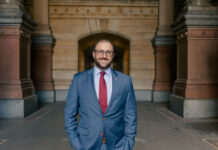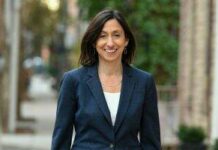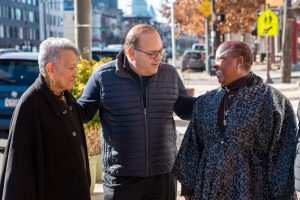
According to the now locally famous five-way tie poll for the Philadelphia mayoral race, the main candidates are about as close as they can be. Rebecca Rhynhart has 18%, Cherelle Parker 17%, Helen Gym 15%, Allan Domb 14% and Jeff Brown 11%, with 20% still undecided.
And among the three Jewish candidates, Rhynhart, Domb and Brown, the Jewish vote seems to be about as close as the race itself. While it’s difficult to pin down exact totals for a religious group, we can extrapolate from other demographics that have Jews within them.
Rhynhart, according to a poll analysis by The Philadelphia Inquirer, is doing well with Center City, higher-income and white voters. Domb is getting attention from moderates, educated voters and Northeast Philadelphia. And Brown seems to be making connections with educated residents as well.
Jews are not a major demographic in this race. But with candidates battling for every vote, their outreach efforts to the Jewish community can make a difference. Domb and Brown made a point of saying that they had visited synagogues and advertised in the Jewish Exponent, among other efforts.
Philadelphia’s Democratic Primary is on May 16. It will probably decide the election, as Philly is an 80% blue city.
“Is it going to be the major lead in your campaign? No. Is it going to be a component of your targeted campaign efforts? Yes,” said Christopher Borick, the director of Muhlenberg College’s Institute of Public Opinion, about the Jewish vote. “If you think your strength might be reaching out to older voters, and a segment of that cohort is Jewish, you try to reach them.”
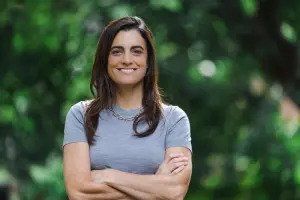
More than 30,000 Jews live in Center City, by far the largest geographical contingent of Jews in Philadelphia, according to the Jewish Federation of Greater Philadelphia’s 2019 population study. Borick, who analyzed that five-way tie poll conducted by the nonpartisan Committee of Seventy for the Inquirer, explained that Rhynhart held a natural appeal for voters in Center City.
The 48-year-old has served under two mayors, Michael Nutter and Jim Kenney, as city treasurer, budget director and chief administrative officer. She also was elected as city controller in 2017, an office she held for more than four years.
“Her background as someone that’s interested in policy in some ways fits the higher educated, more affluent and, sometimes, when you look at Center City, younger constituents,” Borick said. “Part of that group is Jewish.”
Borick also described Philadelphia as “a city of neighborhoods,” and he said Domb is trying to tap into that. The real estate developer and former councilman has made frequent visits to Northeast Philadelphia, which has more than 10,000 Jewish residents.
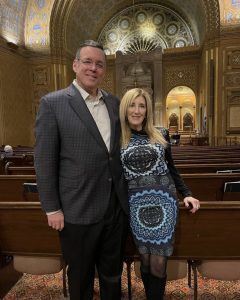
Domb believes that Northeast Philadelphians identify with his rise from humble beginnings to successful real estate developer. The candidate also thinks that since many Northeast residents have started small businesses, they agree with his proposal to end “double taxation,” or the state and local tax hit, now at 15.9%, that slows business development in the city. The developer wants to end the local part of that tax system.
“If we lower that to zero over 10 years, we could create 100,000 good-paying jobs,” he said. “My goal is to have an economic boom in the city.”
Brown’s strength, according to the poll, is not in any one geographic area. But Borick believes that his emphasis on fighting crime, a major issue for each candidate, is playing well with older voters, a high turnout group.
Brown, a grocer who owns several ShopRite locations, said that the issues in this race, crime and city services especially, cut across neighborhood and demographic lines. He has heard about them from Jewish voters, but also from other residents. That’s why he tries to listen to people’s personal stories and then make a general appeal.
“No matter what group you look at, they’re not completely homogenous. We have our own issues based on our life experiences and our work. Jewish people aren’t homogenous. I didn’t take for granted that I understood. I went and listened,” he said. “In this race, the major issues really cut across the whole city. I’ve found very few neighborhoods that don’t have the same list. They pretty much agree that a lot of our problems emanate from structural poverty that has not improved over the decades.”




